
Background information
Apnoea diving: Take a deep breath and float relaxed through the underwater world
by Siri Schubert

The waste divers have set themselves the goal of removing rubbish from Swiss waters with so-called Cleanups. Last weekend I joined them.
It’s Sunday morning, 9 a.m. sharp. A group of people, heavily loaded with air tanks, wetsuits or dry suits and diving fins, arrive in Steckborn on the shores of Lake Constance. After the short, heartfelt «Hi, great to see you» there’s a concentrated silence. This means the preparation of the diving equipment has begun. After all, the people here have a mission: they’re waste divers. They want to rid that section of lake of any rubbish water sports enthusiasts, walkers and probably bike thieves have carelessly thrown into the water – or lost, because that also happens.
Matthias Ardizzon has been president of Abfalltaucher Schweiz (Waste Divers Switzerland) since 2018, an association which was founded in 2010. Matthias – aka Mättu – sums up his personal motivation in one sentence: «We only have one planet and we have to preserve it as best we can.» That’s why he organises clean-ups at Swiss lakes throughout the year, negotiating with authorities for permits, looking for sponsors and making sure that the 130 members and volunteers can fish litter out of the waters during the clean-ups. In turn, helping to protect the environment.
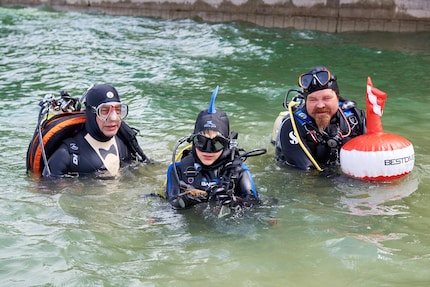
I’ve been a member of the Waste Divers for about a year and a half and have taken part in the underwater clean-up events many times. This time I’m back as a diver at the clean-up in Steckborn. After getting my equipment ready and listening to the safety instructions, I enter the water in a team of two with Thomas, another club member. After the safety check, we dive down. Unfortunately, the visibility is poor and the water is full of floating bits stirred up by the wind-driven swell. Searching for rubbish is not going to be easy.
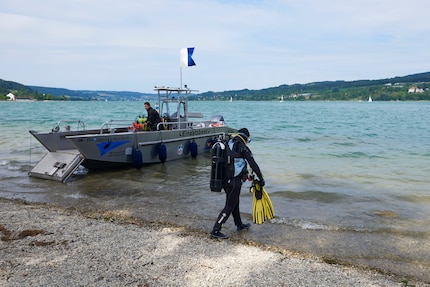
Since most of the litter is near the shore, we only dive about six meters deep on the first dive. We quickly find the first cigarette butts and snus bags, which we let disappear in the red waste net we brought with us. Cigarette butts are terrible for the water. One butt can pollute up to 1,000 litres of water (equivalent to about six to seven full bathtubs). We find two empty beer bottles and a crushed beverage can too. Then we find something that looks like an allergy pen which most definitely didn’t land in the water on purpose.
While we search for litter underwater, other helpers are active on the beach and on the dive boat. Each dive team is accompanied by a shore team that keeps track of the divers’ position based on the rising bubbles and is on hand if the dive team needs assistance. At the same time, they also collect litter on land and soon have collected a cart full of PET bottles to be recycled.
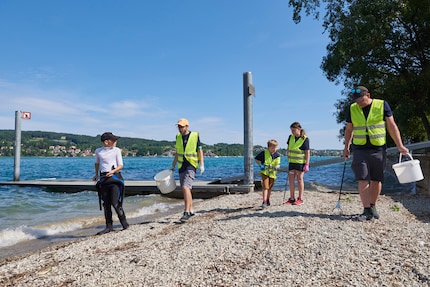
Meanwhile under water we’re very busy. My diving partner Thomas has discovered an old car tire, which we attach to our dive buoy and bring close to shore. The shore volunteers then pull the tire out of the water with a rope. It’s real team work. We dive down again and find two pairs of prescription glasses and two pairs of sunglasses, probably lost by water sports enthusiasts.
Overall, we find less litter here than at other Cleanups. Even if bulging bags of litter make you feel like you’ve done something really good, less waste is a good sign. It shows people here take care of their environment and don’t use the lake as a garbage can. Even in Steckborn – as in almost every other Cleanup – they fished a bicycle out of the water.
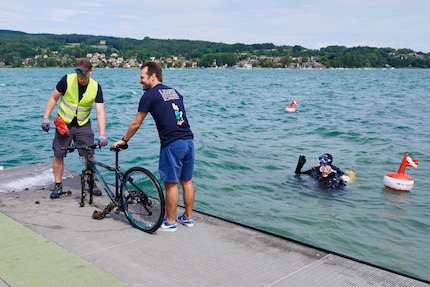
Nils (21) and Lou (19) are joining the Waste Divers as helpers for the first time. So far, the two diving enthusiasts from Zurich have mainly gained their underwater experience in the Mediterranean Sea and the Indian Ocean. The idea of combining their hobby with something meaningful had been on their minds for some time, so they specifically searched for Cleanups in Switzerland and came across the Waste Divers.
For Nils it was the first dive in a Swiss lake. He «very much enjoyed» his first stint with the Waste Divers. The two young divers found a rubbish bin and an anchor at a depth of about ten meters, which they brought ashore with the help of the buoy. «Pulling up the anchor and the rubbish bin from the depths of the water was really cool», Nils says. They don’t have any concrete plans yet, but they can see themselves taking part in another Cleanup.
Almost anyone who wants to can join the Waste Divers. On land, helpers without diving training are welcome. Trained, certified divers can participate in Cleanups underwater. However, all participants must register in advance so that everyone knows where he or she is needed. Depending on experience and dive level, a check dive is necessary, because safety is the top priority when diving.
Time and again, the Waste Divers also offer workshops for further training, as was the case most recently in the spring on handling lifting bags. This is useful when bringing heavy, awkward objects such as barrels or shopping carts to the surface.
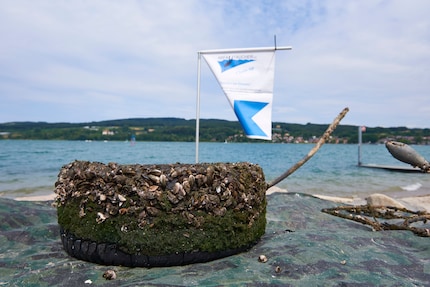
After about an hour of diving, the divers gather again on the meadow in front of the rowing club in Steckborn. Alongside the rubbish almost everyone has a story to bring to the surface too – for example, a sighting of a baby pike or a crab. Even if the removal of waste is the main focus of the missions, it’s also about a shared experience of nature and the fun of diving.
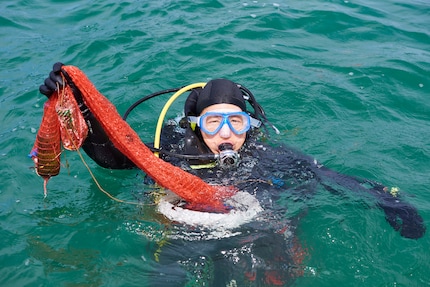
After the surface interval, some dive teams enter the water again for a second dive. My partner and I dive a little deeper this time, but even there we are pleased to find little litter.
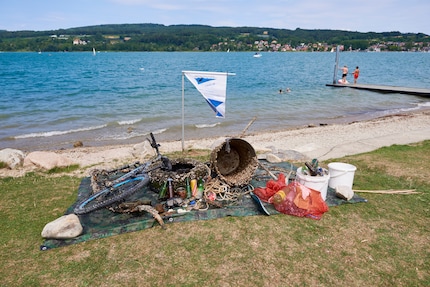
While for us the day comes to an end after surfacing and taking care of our equipment, there’s still a lot to do for the organisation team and club president Mättu. They load the waste so that it can be disposed of properly and, if possible, recycled. Ideally, the items from the lake can even be used again or the owners can be found. This is often the case, but not with this Cleanup.
Header image: Stefan Munsch/Video: Siri Schubert
Research diver, outdoor guide and SUP instructor – I love being in, on and around water. Lakes, rivers and the ocean are my playgrounds. For a change of perspective, I look at the world from above while trail running or flying drones.
Interesting facts about products, behind-the-scenes looks at manufacturers and deep-dives on interesting people.
Show all